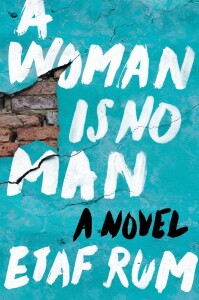
Rum’s powerful debut novel begins with an arranged marriage. In 1990, Isra’s family is eking out an austere living on the outskirts of a town in the West Bank, having been driven out of their home by the Israeli invasion, which they call the Nakba—the Catastrophe. They are delighted to marry off their 17-year-old daughter to the oldest son of an American Palestinian family who are looking for a quiet, submissive Muslim girl.
The marriage to a stranger doesn’t come close to Isra’s dreams of romance and adventure, but it has to be better than the constant beatings and verbal abuse from her parents. Instead, it is worse. Isra often has cause to remember her mother’s warning: “There is nothing out there for a woman but her bayt wa dar, her house and home. Marriage, motherhood — that is a woman’s only worth.”
Adam and Isra live in the basement of his family’s crowded Brooklyn home. Upstairs are his parents, Fareeda and Khaled, and his three younger siblings. Isra becomes, essentially, a prisoner in the house, where Fareeda watches soap operas while Isra does most of the housework and cooking.
As their Bay Ridge neighborhood has a large Palestinian population, the cultural norms are enforced. For example, only a prostitute would leave the house by herself, and Fareeda takes her only to homes of other women where Isra has to endure snubs from the other women for not having produced a male child. Thus, she is unable to develop social connections. Her plight illustrates the way self-blaming and cultural shaming add to the abuse of women.
Even as Adam takes to drinking and beating her, Isra understands that his lot is not easy either. As the eldest son he is expected to run his own convenience store, help at his father’s store, and then even help his spoiled younger brother set up a third store. She also taps a larger perspective.
The wounds of her childhood—poverty, hunger, abuse—had taught her. That the traumas of the world were inseparably connected. She was not surprised when her father came home and beat them mercilessly, the tragedy of the Nakba bulging in his veins… She knew that the suffering of women started in the suffering of men, that the bondages of one became the bondages of the other. Would the men in her life have battered her had they not been battered themselves?
In a dual timeline, we meet Isra’s oldest daughter Deya, now 18. Isra and Adam have died, and their four daughters are being raised by Fareeda with the same strict rules. Even as her grandmother searches for a husband for Deya, the young woman wants to break free and go to college. Eventually an estranged family member reveals some jarring truths about the family’s history to Deya and encourages her to stand up for herself.
Despite the repressive, patriarchal culture portrayed in the story, several characters step up to say that such treatment of women, little more than servants who don’t even sit at the table to eat with the men, goes against the Koran and Islamic teachings that celebrate the role of women and enjoin men to honor them. We are told that the Prophet Muhammad himself said, “‘Observe your duty to Allah in respect to the women, and treat them well.’”
One thing that stands out to me is the role of books and reading in the story. For Isra, her sister-in-law Sara, and her daughter Deya, these are the tiny windows into the world and sole comfort in their severely restricted lives.
I’ve read several books recently that frame a main character’s engaging personal story in an explicit political framework: Afterlife, by Julia Alvarez; Our Missing Hearts, by Celeste Ng; Wives and Daughters, by Elizabeth Gaskell; even The Radiant Way, by Margaret Drabble. In trying to understand how the authors manage to keep the politics from overwhelming the story, what I see is their intense focus on the main character’s experience.
Rum’s task must have been especially difficult given today’s Islamophobic prejudices and anti-Arab stereotypes. And it’s no wonder she found it difficult to make the men into rounded characters, because of the cultural norm that once the men leave the house, what they do in invisible to the women stuck there. And we only have the women’s experience.
It’s important to note that Rum describes their perception of their lives sometimes as simply brutal and other times in a more nuanced way, such as Isra’s recognition of the effects of their historical trauma on the men. I’m sure not all Palestinian families are like the ones portrayed here, but some are and I’m grateful to Rum for breaking the code of silence and letting us in.
Can you recommend a novel about Palestinian families?
